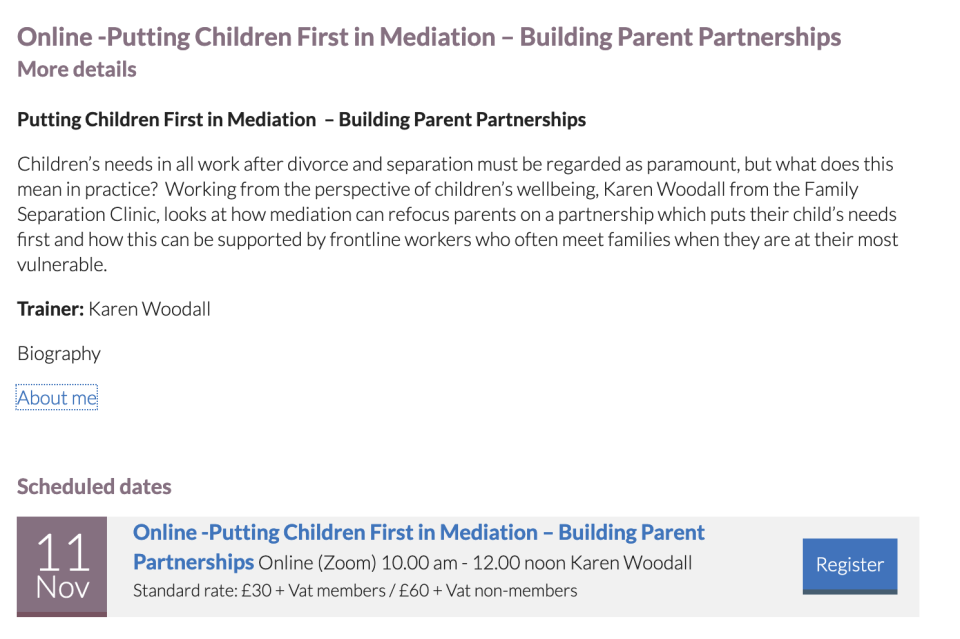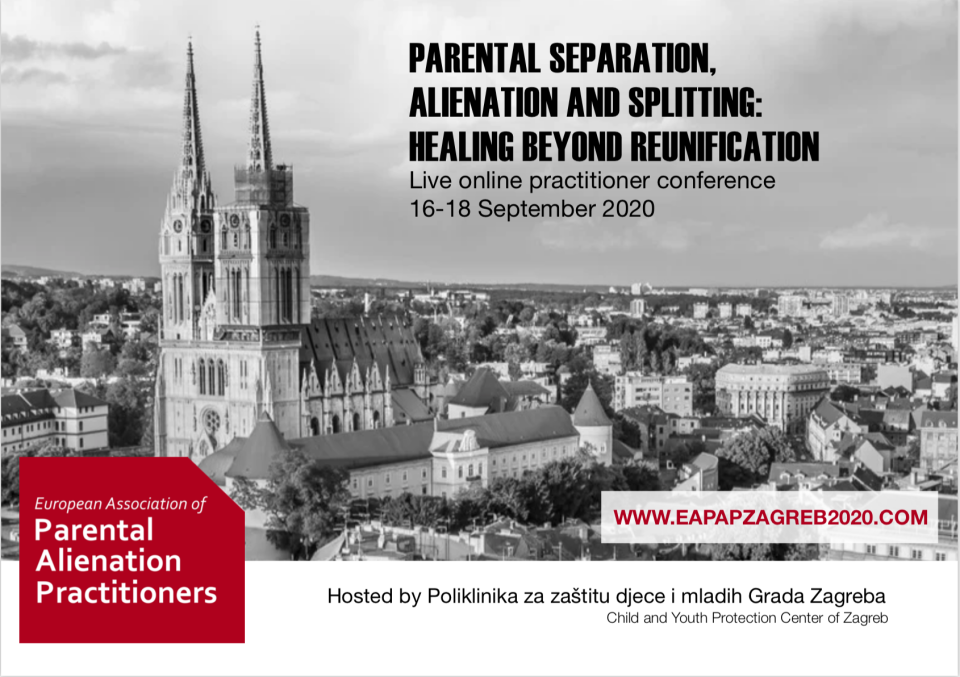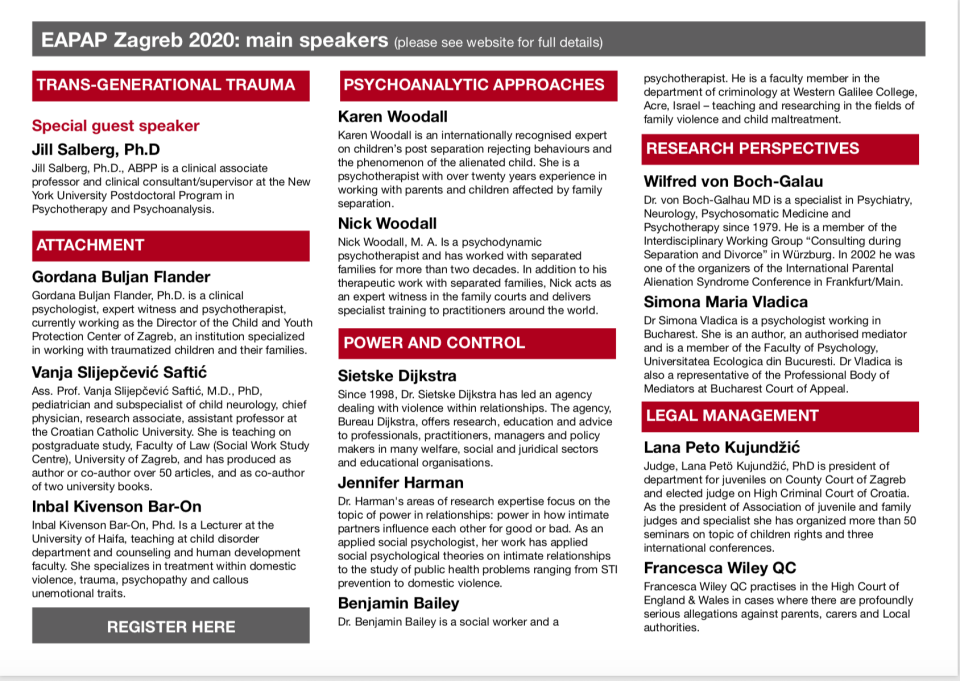Yesterday I ran our Zoom Seminar entitled Understanding the Alienated Child, which was attended by people from seven countries around the world. Eighty percent of the attendees were women.
Working through a two hour programme (which ran over to two and a half hours because as usual there is so much to say), we looked at a reconfiguration of parental alienation which moves away from the good/bad split inherent in the narratives around this issue and towards the reality of this issue as relational trauma in divorce and separation.
The issue of alienation of a child is, in my experience, ridden with splitting because it is a problem which arises from hidden psychological instability in families. Whilst on each side of the issue campaigners try to characterise the problem as being the fault of someone else, the reality is that alienation of a child is a problem which arises in families where splitting behaviours are already in play.
If this were not the case then every divorce and separation would result in a child being alienated and that simply doesn’t happen. When alienation arises, there is usually a parent who is displaying splitting behaviours and another who is being forced to react to those. In the middle is a child who is triangulated into the relationship breakdown.
Alienation in a child is alienation from the self first, the development of what Winnicott called the False Persona. This original split, which is projected outwards onto the parents, is a good child/bad child split in which the identification with the parent who is putting most pressure on the child and who is perceived to have the most power, causes the child to split off and deny, those aspects of self which they perceive to be like the parent who is to be rejected. These parts are pushed into the unconscious and then as part of the denial process, are projected at that parent. This original split in the child is a serious problem if it is not resolved and leads to later life experiences which are all focused upon the problems caused by the lack of an integrated healthy self.
This is not an easy defence mechanism to work with because on the outside the child professes immense love for the parent to whom they have become hyper aligned. The reconfiguration of understanding of alienation however, helps to unlock the conundrum and illuminates the problem so that it can be understood. The question is not, why is this child rejecting this parent but why is this child hyper aligned?
Hyper alignment or hyper attachment is triggered by threat of abandonment and/or the identification with the aggressor dynamic. Whilst much is said in the campaign world about the issue of alienation being gender neutral (which is used to mean it happens to mothers and fathers), in fact alienation in clinical practice is very much seen to be gendered (which means that mothers and fathers cause alienation of a child differently).
Fathers are seen to alienate their children using overt control strategies of threat towards the children’s mother and a campaign of denigration of her capacity to care for children. Fathers will often partner with their own mother to parent their children in these circumstances which in itself is a disruption of the family hierarchy.
Mothers are seen to alienated their children using covert strategies which enmesh their children into their psychological and emotional experience, often displaying inter-psychic relationships with their children which have no boundaries. This is often the result of trauma in the mother which belongs not to the relationship in the here and now but in the past, in childhood. Differentiating between trauma caused by relationship breakdown and risks from a parent in the here and now and that which is emanating from the past, is part of the assessment process.
The current effort to portray alienation of a child as being something which is used to give children to abusive fathers is contradicted by the number of cases of mothers who are alienated from their children. Over the past ten years, I have worked with just as many alienated mothers who received their children in residence transfer as I have fathers and yesterday’s Zoom Seminar proved again that this is an issue which affects mothers and fathers.
Unpacking the experience of alienation of a child by a father against a mother demonstrates clearly that whilst the behaviours in alienating parents are gendered, (fathers and mothers behave differently), the impact on the child is exactly the same. A child who is alienated from the self will produce a false persona and will hyper align with one parent and reject the other. In situations where a child is rejecting because of something a parent has actually done, will show an ambivalent rejection and will not display the signs of contempt and disdain that are seen when induced psychological splitting causes alienation.
This landscape is ridden with splitting. In the concentric circles around alienated children are people who receive the negative projections which emanate from those who use psychological splitting as a defence. From the rejected parent to the unaware professional to the angry armchair psychologist to the vociferous and often viperous campaigners, splitting cuts like a knife to divide people into powerful, sometimes delusional beliefs that they are on the side of the just and the righteous and the rest are demons in disguise. When we see that dynamic, when anyone is busy dividing the world into absolute good and absolute bad, splitting is in play and balanced outcomes will not be found.
Which is why, working with parents and practitioners in safe spaces is so important. Away from the he said/she said, the naysayers and those who metaphorically adorn sandwich boards proclaiming they are the holders of the truth, much work is being done in education, training and support of practitioners and parents who want to work with an integrated model which helps families affected by relational trauma after divorce and separation.
Just as alienated children need protected space from splitting behaviours in order to restore an integrated state of mind, work with practitioners and parents also takes place in calm, protected space.
I enjoyed working with so many people from around the world yesterday, it was two and a half hours well spent with people who were interested in finding new routes to resolution for this pernicious and painful problem in families. We will do more seminars as the year progresses, alongside developing tools to assist parents and practitioners who work with them to work in a new, holistic approach to healing relational trauma in divorce and separation.
Understanding the Alienated Child – A Zoom Seminar
The recording from yesterday’s seminar will shortly be available for download from the Family Separation Clinic Website. If you attended yesterday you will receive a link to this recording as soon as it is available. Anyone who paid but was unable to attend or who was locked out of the session after leaving temporarily, we will also receive the recording.
News from the Family Separation Clinic
Instructing the Clinic
The Clinic will close for vacation in August and re-open on September 7th. Our coaching, part 25 and consultancy services will be available for instruction from September 7th but please be aware that I am fully booked to January 2021 and cannot take new instructions until then.
Supervision
I am currently supervising cases in the USA, Republic of Ireland, Israel, Sweden and Hong Kong as well as the UK. Enquiries about supervision of cases should be sent to office@familyseparationclinic.co.uk
Training to Family Mediation Association
I have been delivering online training via Zoom to the Family Mediation Association throughout this year. This training will hopefully resume face to face in the Autumn.

See here for details on how to book
The European Association of Parental Alienation Practitioners Conference – September 2020
Building the Path Back Home – A Workshop For Parents
A workshop for parents will be held as part of the EAPAP Conference 2020. Focused on healthy strategies for recovering alienated children, this workshop will be run by Karen Woodall and Nick Woodall and will be based upon the work which is done at the Family Separation Clinic where treatment of children suffering from induced psychological splitting is the core focus.
Based upon the successful services of the Clinic, which are delivered using a psychoanalytic model of understanding and trauma informed interventions, this workshop is for all rejected parents who want to build a healthy future for their children.
Book for the Conference and Workshop Here






Hello Karen – re the ‘Book for the Conference and Workshop Here’ link in your blog post above:
The dates at that link have not been updated for the September 2020 conference and workshop. Could you please correct that, so that I and others can make a booking? Thank you
LikeLike
Hi Karen, thank you for this insight on gender specific in relation to the splitting dynamic of the child. Thank you for also bringing clear differentiation of the child’s response for which we see as alienation verses hyper align. All three of my girls are hyper aligned to their father who is in a identity crises of his own, leading me to see why he chose to go the femanine way, a covert means of alienation; fooling the family court system and all the professionals involved in the case, who have failed to protect my girls from the covert tactics to alienation. What this shows is there is no gender specific to the approach of overt or covert means for the alienator to achieve their mission of winning the power and control of their children, or others that split relations in families. As a targted parent, I retain my presence in secrecy with my girls, accepting the captivity they are in, and working around their loyalty conflict they have with their dad.
LikeLiked by 1 person
Interesting: do I understand you are in contact with the girls? What is your way?
LikeLike
We all live with the good, the bad, and the ugly we cannot deny them. It is how we live with them that determines the health of the outcome. Escaping from polarisation is not the answer, rather accepting polarisation and moving with the flow, accepting the inevitable but not being enveloped by it as we progress on life’s journey.
The job of the target parent is to maintain a sense that opinion is okay, but there are more important things such as sensitivity to feelings, acceptance, and acknowledgment of them, empathy. Right or wrong should not take center stage. A parent who adopts the target parent persona is destined to lose if they fight their battles purely on laws and facts.
In one case a resident parent who attempted alienation would try enmeshment with the daughter and then later, with the youngest boy, abandonment tactics. They didn’t succeed because the target parent stayed in contact through various means eventually abating the destructive will of the would-be alienator.
On the anti-enmeshment campaign, it was the attention to the detailed needs and feelings of the child which helped. With the boy, the abandonment campaign was thwarted by re-affirming the need for him to have a continued relationship with his alienator parent, whilst at the same time giving him full support and attention, not denying his feelings.
…………………….
I was disappointed to hear that 80% of your attendees were women because it made me worry for all those men who were missing out. I thought of all those men trapped in their personal psychological dramas, decrying the unfairness of it all, the fate that has befallen them, the inequalities that have led to their demise, children blanked out but at the same time not forgotten. They are not doing what is necessary to make significant changes but they could be the catalyst if they but knew it. They remain the parental figure with latent capacity.
LikeLike
Re: Disappointment that “80% attendees were women.” Please consider that many of the women attendees – and Karen may be able to verify this – are likely doing so on *behalf* of – or in partnership with – the men directly impacted by this, i.e. they are the family supporters (mothers, sisters, close friends of the alienated/impacted dad) or the new wife and/or partner. I myself am the female supporter/partner of a father who experienced an over-the-top severe case where the court -ordered an “alienation intervention” (w/o the necessary no-contact order to allow the healing to take hold) was a disaster. Things got much, much worse before they got better and the father’s incredible actions/empathy/resilience in the following years resulted in all of the kids making it through to the other side (being able to “get” what happened, overcome the odds, and navigate showing affection to both parents) by their teens/early 20’s. Frankly, this success took everything he had, at all times, for years: he had 50/50 custody of the kids and it was a highly dynamic situation that did not allow time for seminars. It was I who did a lot of the reading, researching ,and networking only to learn what he *already* knew by being very intuitive and on the front line. In sum: this is a very important point. In the US, men are still over-represented in the numbers of alienated parents. This is largely so because of the history of our laws/legal approach – but there are clearly great numbers of alienated moms. The overrepresentation we see on websites and in seminar/out-reach on this topic has a lot more, i believe, to do with the dynamic that: 1) women (in an alienation dynamic) are more likely to seek such help than men and 2) that women are highly represented in the related family psychology/social worker fields. Finally – I think this is an EXCELLENT site with real cutting-edge insights/observations on how to “crack the code” in resolving the severe end of this crisis. I have been to several conferences where Karen and Nick have spoken such as PASG (attending as someone who has been on the “front line” by proxy) and view the Woodalls as true pioneers in this area. Kudos!
LikeLike
I am glad our work helps Jude. I will be delivering more zoom seminars in the autumn for everyone who is involved in assisting families affected by alienation, whether that be as partners as parents or practitioners – the more people we help to help themselves, the harder it is for the problem to be ignored. K
LikeLike
Hi Karen…I found this both an insightful and a soul destroying post to read. The explanation accounts perfectly for what has happened to my daughters, but I knew this already – you’ve just phrased it better than I could have. What really hurts is the prospect of what’s been done to them undermining their futures. Again, this isn’t a new revelation, indeed, it increasingly occupies my thoughts as their mother’s influence becomes greater and greater.
I live only two and a half miles down the road from my girls, now 17 and soon to be 15. I recently wrote to them, proposing to come and see them and to listen to anything they might want to say to me. I expected this approach to be rejected, but the venom in the reply – very much inferring everything was my fault – was unexpected. I will try again…I have to for their sake and because, despite the self evident reality of our situation being just as described in this article, no else will do anything for us. No one will help…. I don’t want my girls futures destroyed by their mother’s poisonous influence. I know I’ll be rejected again and again and it won’t surprise me if their mother resorts to bringing in the authorities to try and prevent me approaching our daughters, but I will not give up on them!
BTW – did you have a chance to look at the book manuscript I e-mailed you?
LikeLike
HI Robert, I don’t think I have seen the book manuscript, could you resend it – karen@karenwoodall.blog
the defining element of alienation is the disdain and contemptuousness you describe, it truly is horrible, the venom is very much what is seen in splitting behaviours. Sadly, to this day we do not have a widespread understanding of this issue and how to treat it meaning that more families are left without help. Part of what we are trying to do is change that and make more knowledge and more help available. Too late for too many I know but we keep trying. K
LikeLike
Thanks Karen – I previously sent it to that email address, but I’ll resend my manuscript again now. I’m not doing this as some sort of vanity exercise – I believe what I’ve written might have some real value in the public domain, exposing not only the appalling conceit of the alienating parent and how hers was a very long term and deliberate strategy, but also the thoroughly corrupt practices of the Family Court and its agents. It also demonstrates just how completely a happy and fulfilling life as a parent can be utterly destroyed, I would appreciate your feedback very much, if you can find the time. Rob
LikeLike